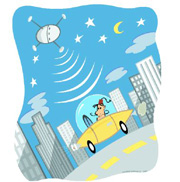Dave Blaisdell has a tough time leaving his car. Since the Magnolia Hi-Fi salesman signed up for satellite radio seven months ago, time spent behind the wheel seems all too short. “I’ll never not have satellite radio,” Blaisdell said.
Paying for radio is a foreign concept for most, but two companies are betting it will be as popular as paying for the greater variety of TV programming on cable and satellite. Satellite radio has been on the market since last year, when XM Satellite Radio introduced its subscription service. For $9.99 a month, customers get 70 music channels (30 of which are commercial-free) and 30 news, talk, sports, and entertainment channels. Competitor Sirius Radio launched its service in June. At $12.95 a month, Sirius is slightly more expensive than XM, but all 60 music channels are commercial-free. An additional 40 stations are dedicated to news, sports, and entertainment.
Signing on to satellite radio isn’t as cheap as the monthly fees, though. A vehicle needs to be outfitted with an in-dash modulator, antenna, and special receiver to capture the antenna signal and send it to the radio. The components can be had for around $250, though the fanciest models can boost the cost to as much as $2,500. Customers who already have a stellar radio system in their car can save some bucks by buying an adapter rather than a new radio. The adapter interrupts FM reception between the antenna and radio and allows the satellite feed to come through.
SATELLITE-RADIO fans say that the initial cost of hardware is worthwhile. Unlike standard terrestrial-broadcast radio, satellite radio offers tune selections beyond popular playlists. A Sirius station called the Vault plays seldom-heard rock songs by well-known artists. Flipping through XM stations turns up Latin jazz, progressive fusion, old-school R&B, or even Hindi/Indian music. Sirius has 11 channels devoted to the rock genre alone.
“Regular FM radio has too much repetition and too many commercials,” Sirius spokesperson Jim Collins said.
XM and Sirius compile their playlists in state-of-the-art music studios. At Sirius, programmers can choose from more than 200 million songs in a database and compile multiple programs in a short period of time. Both companies have live studios where groups can perform or give interviews.
And unlike standard radio, satellite radio keeps playing outside of major urban centers. Anyone who’s driven over the Cascades can appreciate the rare solid signal on remote roads. Sirius says that its signal is available 99.9 percent of the time, with blips only when a tunnel or transmission tower blocks it. Collins took a recent road trip with standard FM radio in his car. He crossed eight or nine states and often found himself in a radio void. “I was flabbergasted by how many times we couldn’t pick up a single station,” Collins said. “The bulk of the country is audio starved.”
Poor radio reception isn’t a problem only in vehicles. XM offers a removable radio that can be transported to a power cradle inside the home. Sirius plans to offer home products by 2003, though both companies say that the car market will remain their focus.
It isn’t likely that more companies will join Sirius and XM in the satellite-radio market. In 1997, the FCC held an auction for rights to the new S-band radio frequency. Sirius and XM both paid around $90 million to jump in the game. After forking over funds to the FCC, the companies still needed to launch satellites and build studios to program music. Sirius invested $1.9 billion. “Good luck trying to get $2 billion in this economy,” Collins said.
AT THE END OF September, XM had 201,500 subscribers. Sirius, which only started signing up subscribers last summer, is up to 14,000 and needs to reach 2 million to break even. The company is pushing its product by taking semi-trucks with listening booths to major sporting and music events.
Subscriber growth will likely depend on a consumer’s willingness to pay for radio, a traditionally free form of entertainment. Satellite radio devotees say that the monthly fee should not be compared to free FM radio, but to CD purchases. “After you hear the same CD for a while, you need to hear a new one. You’re always feeding the dragon,” Collins said. “Satellite radio takes that piece away.”
The initial equipment cost could also be a deterrent to potential subscribers. Some automobile companies are now offering satellite radios as dealer-installed options. Sirius has an exclusive agreement with BMW, Ford, and Chrysler, and XM has a contract with GM.
Blaisdell says that when satellite radio first came out at Magnolia Hi-Fi, it seemed as though they were installing units all the time. Though sales seem to have slowed, he’s noticed an increase in the number of satellite radio-equipped vehicles around the Puget Sound area. For Blaisdell, no vehicle of his will ever be without satellite radio. “The music is always new, and it sounds good,” Blaisdell said. “I’ll never go back.”
Satellite-Radio Services
XM SATELLITE RADIO
100 channels (30 commercial-free)
$9.99 per month
Allied with General Motors
SIRIUS SATELLITE RADIO
100 channels (all commercial-free)
$12.95 per month
Allied with BMW, Chrysler, and Ford






